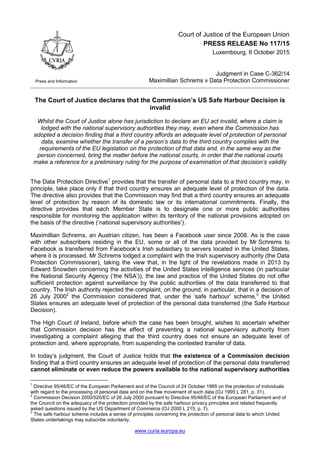1) The Court of Justice invalidated the European Commission's "Safe Harbour Decision" which found that the United States ensured adequate protection of EU citizens' personal data transferred there.
2) While the Commission alone can invalidate an EU act, national supervisory authorities can examine whether data transfers comply with EU law and refer questions to national courts to request a preliminary ruling on a decision's validity.
3) The Court found that the Safe Harbour scheme did not ensure a level of protection essentially equivalent to that guaranteed in the EU because US public authorities could access personal data in a disproportionate manner without effective legal protection for EU citizens.


